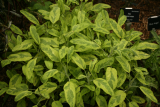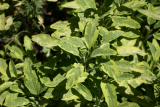Additional notes (click to expand)
Medicinal
Culpeper: ‘Salvia. Sage. ... it stays abortion in those women that are subjedt to come before their times, it causeth fruitfulness, it is singular good for the brain, it strengthens the senses and memory, helps spitting and vomiting of blood.
Culpeper, Nicholas. (1650). A Physical Directory . London, Peter Cole.
Other use
Notes: Used as a gargle to relieve toothache in herbal medicine. Widely used as a flavouring in cooking e.g. sage and onion stuffing used for poultry dishes.
Oakeley, Dr. H. F. . (2013). The Gardens of the Pharmacopoeia Londinensis.
link
The name Salvia meaning 'healthy'. Elizabeth Blackwell (1737) wrote that it had '... all the noble Properties of the other hot Plants; more especially for the Head, Memory, Eyes, and all Paralytical Affections. In short, 'tis a Plant endu'd with so many and wonderful Properties, as that the assiduous use of it is said to render Men Immortal" with which Hans Sloane agreed. Its health giving properties were recorded in the aphorisms of the School of Salerno (fl 9-13th century) - quoted in the Decameron [ c.1350, translated: Why should man die when Salvia grows in the Garden']. Some salvias, such as Salvia divinorum, contain hallucinogenic compounds.
Oakeley, Dr. Henry F. (2013). Wellcome Library notes.
link
Salvia officinalis L. 'Icterina'
Family: LAMIACEAEGenus: Salvia
Species: officinalis L.
Cultivar: 'Icterina'
Distribution summary: Mediterranean
Habit: Shrub
Garden status: Not currently grown
Reason for growing: Medicinal

